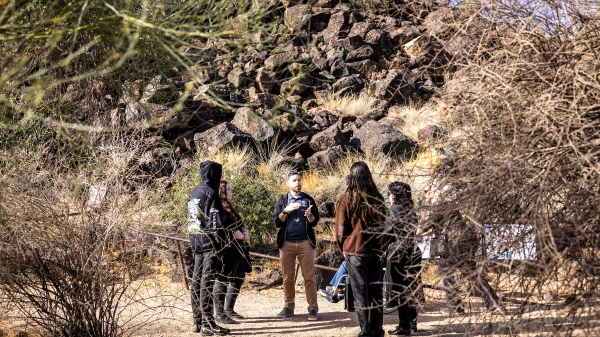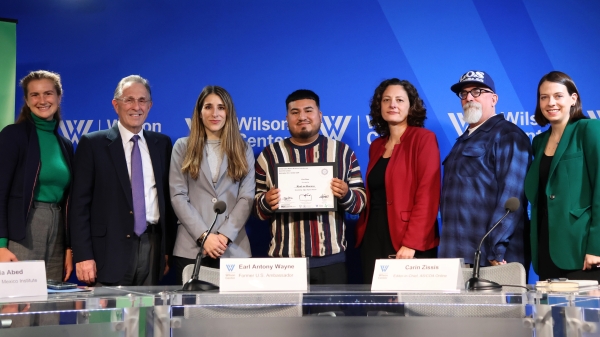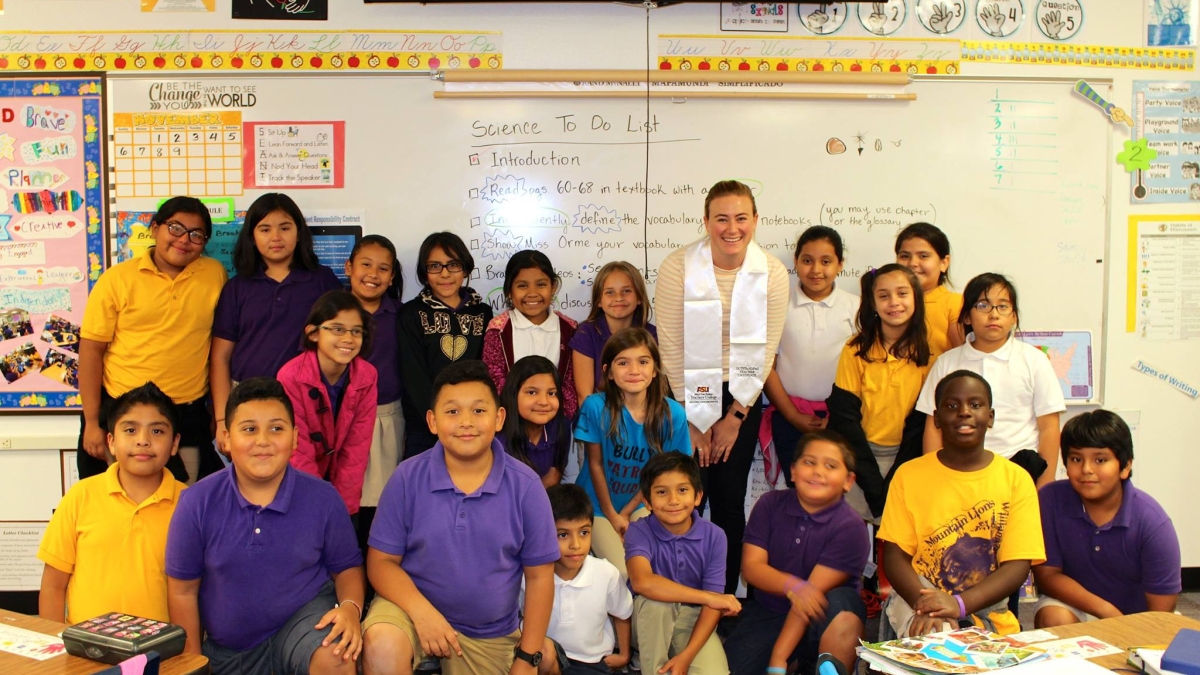Editor’s note: This is part of a series of profiles for fall 2016 commencement. See more graduates here.
Lauren Orme was raised on an Arizona cattle ranch so remote, there’s no town on the mailing address. Her mother is an alumna of the Mary Lou Fulton Teachers College at Arizona State University, and Orme chose education, too, leaving the ranch to become an outdoor adventure instructor. Then everything changed.
Like every teacher candidate from ASU’s Mary Lou Fulton Teachers College, Orme (pictured above with her class) is graduating with workplace experience, thanks to her student teaching placement. But Orme had brought classroom experience with her, entering the Master of Education with Arizona Certification program after having been an assistant teacher in a small private school in the Bay Area.
“I had planned lessons before, taught for days on end, developed curriculum,” she said. “I had led parent-teacher conferences. I was sure the real-life teaching experience I had, combined with the excellent curriculum in the ASU MAC program, meant student teaching would be a pleasant formality for me before graduating. I was very wrong.”
Orme was placed in a high-needs school in central Phoenix. Every student there received a free breakfast, and most were on the federal free- or reduced-lunch program. Most were bused to school, or walked. Most were English language learners. It was shockingly different from the sheltered, privileged learning environment of her experience, and Orme says she couldn’t be more grateful.
“My student-teaching placement, and specifically the 26 students in my care, have profoundly changed both my teaching and my view of the world.
“No child arrives at school a student,” Orme said. “I had to learn how to support a room of individual children so they become students. Knowing when a child desperately needs to run or laugh, or when angry outbursts are masked despair and require love instead of discipline, or when a child just needs a moment of security and peace are the greatest lessons my student teaching experience taught me.”
Orme graduated this month with a master's degree in elementary education, and answered some questions for ASU Now:
Question: What's your hometown?
Answer: No town! I grew up on my family's cattle ranch located near Cordes Lakes, Arizona. I'm proud to be the fourth generation of my family raised on our ranch, and I celebrate my deep Arizona roots.
Q: What was your “aha” moment, when you realized you wanted to study the field you majored in?
A: My journey to becoming a teacher has been a gradual, though natural one. I have always harbored an intrinsic love of the world and enthusiasm for learning. I worked for several years as a marine science and outdoor adventure instructor, and it was there where I learned the world through a child's unlimited imagination and hopeful perspective was where I wanted to dwell. It did not come as a surprise to me that teaching was my calling; my mother, who herself is a graduate of the Mary Lou Fulton Teachers College, was a tremendous teacher in Arizona for many years. Her example, passion and influence inspired me then and continues to do so.
Q: What’s something you learned while at ASU — in the classroom or otherwise — that surprised you or changed your perspective?
A: I was surprised by my passion for Title 1 schools. I was privileged to attend private schools myself, and had no experience with public school in general, let alone Title 1 schools. I did not anticipate falling in love with my students the way that I did. They came from disadvantaged backgrounds, and they changed my perspective on life, made me deeply appreciate the resilience and strength of their families, and taught me more about culture and community than I ever thought possible. I have a realized perspective on what is important and the true definition of success.
Q: Why did you choose ASU?
A: I chose ASU because the MAC program had exactly what I was looking for. It suited my needs as an adult who needed to work during graduate school, and the accelerated program has launched me back into the workplace quickly!
Q: What’s the best piece of advice you’d give to those still in school?
A: Save your money! Those loans are so beautiful when they disburse, but try to budget the best you can. I wish I had learned this life skill much earlier!
Q: What was your favorite spot on campus, whether for studying, meeting friends or just thinking about life?
A: I love the walkway lined with orange trees along Gammage on an early summer night. The smell of those blossoms are quintessential Phoenix to me.
Q: What are your plans after graduation?
A: I am temporarily relocating to Santa Cruz, California, to pursue teaching by the ocean and continue working toward my dream of being a children's book author. I'll be back, though!
Q: If someone gave you $40 million to solve one problem on our planet, what would you tackle?
A: I would support sustainably operated farms and ranches by providing grants for environmentally conscious agriculture. Additionally, I would increase awareness and education about supporting local farms and eating sustainable, local food. Feeding our planet, doing it responsibly, and educating the future generations on how to sustainably care for our earth is important to me.
More Arts, humanities and education

Petroglyph preserve celebrates 30th anniversary with ancient, modern tales
The Deer Valley Petroglyph Preserve provides a beautiful walk through a pristine desert where chuckwalla lizards are as plentiful as the cacti that comes in many shapes and sizes.It’s also a step…

Kaleidoscope short film contest inspires powerful binational filmmaking in its second year
“We come to this country not to steal anybody’s jobs but to take advantage of the opportunities that the rest ignore. We’ve been taking care of the American soil for many years. But our hands will…

ASU's Neal Lester reflects on life, death of poet Nikki Giovanni
When Neal Lester heard on Monday that poet and activist Nikki Giovanni had died, the news hit hard.Lester, the founding director of Arizona State University’s Project Humanities and a Foundation…
